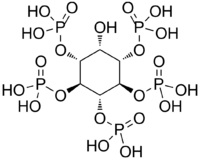Inositol pentakisphosphate
 | |
| Identifiers | |
|---|---|
| 3D model (JSmol) |
|
| ChEBI | |
| ChemSpider | |
| |
| |
| Properties | |
| C6H17O21P5 | |
| Molar mass | 580.05 g·mol−1 |
| Except where otherwise noted, data are given for materials in their standard state (at 25 °C [77 °F], 100 kPa). | |
| | |
| Infobox references | |
Inositol pentakisphosphate (abbreviated IP5) is a molecule derived from inositol tetrakisphosphate by adding a phosphate group with the help of Inositol-polyphosphate multikinase (IPMK). It is believed to be one of the many second messengers in the inositol phosphate family. It "is implicated in a wide array of biological and pathophysiological responses, including tumorigenesis, invasion and metastasis, therefore specific inhibitors of the kinase may prove useful in cancer therapy."[2]
IP5 also plays a role in defense signaling in plants. It potentiates the interaction of the plant hormone JA-Ile by its receptor.[3][4]
References
- ↑ Sigma Aldrich
- ↑ Piccolo, E.; Vignati, S.; Maffucci, T.; Innominato, P. F.; Riley, A. M.; Potter, B. V.; Pandolfi, P. P.; Broggini, M.; et al. (2004). "Inositol pentakisphosphate promotes apoptosis through the PI 3-K/Akt pathway". Oncogene. 23 (9): 1754–1765. PMID 14755253. doi:10.1038/sj.onc.1207296.
- ↑ Sheard, L. B.; Tan, Xu; Mao, Haibin; Withers, John; Ben-Nissan, Gili; Hinds, Thomas R.; Kobayashi, Yuichi; Hsu, Fong-Fu; et al. (2010). "Jasmonate perception by inositol phosphate-potentiated COI1-JAZ co-receptor". Nature. 468 (7322): 400–405. PMC 2988090
 . PMID 20927106. doi:10.1038/nature09430.
. PMID 20927106. doi:10.1038/nature09430. - ↑ Mosblech, A.; Thurow, Corinna; Gatz, Christiane; Feussner, Ivo; Heilmann, Ingo (2010). "Jasmonic acid perception by COI1 involves inositol polyphosphates in Arabidopsis thaliana". The Plant Journal. 65 (6): 949–957. PMID 21205029. doi:10.1111/j.1365-313X.2011.04480.x.
This article is issued from
Wikipedia.
The text is licensed under Creative Commons - Attribution - Sharealike.
Additional terms may apply for the media files.